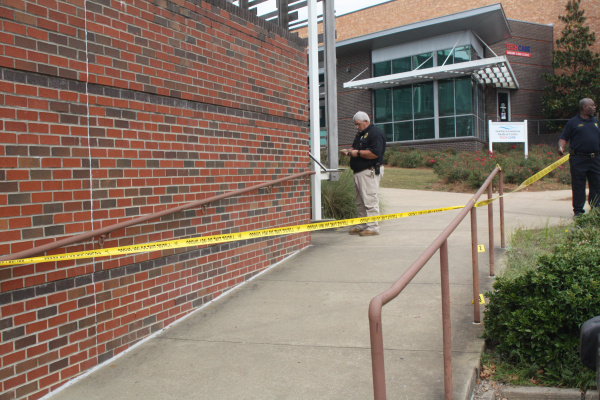Tech stabbing suspect Johnson pleads insanity

Leader file photo
The scene of a stabbing attack outside the Lambright Sports & Wellness Center on Louisiana Tech University campus is taped off on Nov. 13, 2023.
The man accused of stabbing a woman to death and attacking three others on Louisiana Tech University campus has updated his plea of not guilty to not guilty by reason of insanity.
Jacoby Johnson faces one count of second-degree murder and three counts of attempted second-degree murder in the brutal Nov. 13, 2023, stabbing attack outside the Lambright Sports and Wellness Center on Tech campus.
At a pre-trial hearing on March 19, Johnson’s attorney motioned for Johnson’s plea to be changed from “not guilty” to a combined plea of “not guilty and not guilty by reason of insanity.”
The hearing’s minutes show the court expects Johnson’s jury trial to take place in July or August.
Johnson’s defense had already tried to show at a January hearing that the 23- year- old former Tech student experiences hallucinations and is unfit to stand trial. Ad hoc Judge Chet Traylor wasn’t convinced and declared Johnson mentally fit to proceed.
But that hearing was only about Johnson’s present mental state. An insanity plea concerns only a defendant’s mental state at the time of the crime.
Johnson’s defense plans to appeal Traylor’s ruling to the Louisiana Second Circuit Court of Appeal and has until Monday to file a writ, according to court documents.
Records show the state possesses an array of evidence that Johnson attacked local artist Annie Richardson, retired Judge Cynthia Woodard, fellow Tech student Dominique McKane and retired educator Debby Hollimon with a knife on the walkway outside the Lambright entrance that November morning.
In addition to a confession Johnson allegedly gave to Tech police after his arrest, the attack was captured on security cameras, and recently completed forensics show that blood found on Johnson’s shoes and jacket is a match for McKane’s DNA.
When psychologist Charles Vosburg and psychiatrist Dr. Clay Kelly, as part of Johnson’s court- appointed sanity commission, interviewed him from jail in December, Johnson told them he hears voices that compel him to harm himself and others.
Vosburg reported to the court that they couldn’t determine whether these auditory hallucinations were temporary and drug-induced, part of an ongoing mental health condition, or simply fake.
Soon after the incident, Johnson allegedly told Tech’s Assistant Police Chief Bill Davis he had been under stress with school, and he was walking around when he “snapped, felt stressed and got really angry,” saying he suddenly “wanted to attack people,” according to a police report filed in November.
A report from the arresting officer on the scene was filed into court records more recently.
Tech police officer Corbin Porter wrote that after he escorted Johnson to Northern Louisiana Medical Center for treatment while in custody, Johnson reached for him from the hospital bed while the two were alone.
“I asked what he was doing, and he stated, ‘I don’t want to live anymore,’” Porter wrote. “He reached for me two more times more aggressively and I instructed him to sit down and calm down.”
Porter also reported that Johnson grabbed at nurses and medical equipment while being treated and had to be restrained by officers.
For a not guilty by reason of insanity defense to be successful in Louisiana, the defendant must prove by a preponderance of evidence that he was unable to distinguish right from wrong at the time of the alleged crime.
A preponderance of evidence is a lower burden of proof than “beyond a reasonable doubt.”
A defendant found not guilty by reason of insanity is committed to a jail or mental institution until he is found to no longer be a danger to himself or others.

